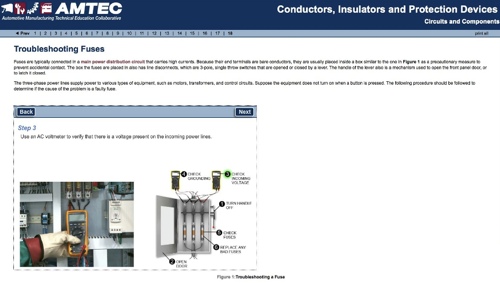From Michigan to Alabama, the Interstate 75 corridor is lined with car manufacturers—and those manufacturers need highly skilled workers to build vehicles. This need spurred the National Science Foundation (NSF) to fund the Automotive Technical Education Collaborative (AMTEC), which brings together community colleges and automotive industry partners to prepare students for careers as highly skilled maintenance technicians and manufacturing engineers.
To date, AMTEC has built 12 full-length courses comprised of 59 shorter modules that bring high-quality technical education to its community and technical college partners in 11 states. The key is a learn-on-demand approach and flipped classroom pedagogy, with lessons primarily built with SoftChalk content authoring software.
Learn on Demand and the Flipped Classroom
Director of Curriculum Walter Barlow was brought into Kentucky Community and Technical College System (KCTCS, AMTEC’S fiscal agent) to explore learn-on-demand programs that would fit future automotive workers’ needs for flexible educational and career pathways. Since securing the program’s 2007 planning grant, Barlow has used SoftChalk; he used it to build the first AMTEC module that went through the KCTCS Learn on Demand quality assurance process.
“We are streamlining access to education,” Barlow explains, allowing students to choose the modules they need to advance their careers and complete assessments to pass through skills they have already mastered.
Building on its systems approach to pedagogy and their learn-on-demand course module structure, AMTEC began delivering “flipped classroom” lessons built in SoftChalk in the fall of 2012. A flipped classroom is one in which instruction takes place outside the classroom; students learn background knowledge about a concept or skill through video lectures, animated Flash learning objects, and digital lessons, all easily included in any SoftChalk learning object. Then, the actual classroom becomes the site for practice, peer coaching and mentoring, rather than lectures and direct instruction. For AMTEC students, more lecture-free classroom time also means more time with AMTEC’s Integrated Manufacturing Simulator, a physical simulator that replicates the integrated systems that advanced manufacturers are using.

Modeling Complex Skills with SoftChalk
The flipped classroom is effective for AMTEC because the program has an imperative to efficiently and affordably educate future workers in technical skills, critical thinking and problem solving. AMTEC modules are developed by college faculty and based on AMTEC’s national skill standards for manufacturing maintenance.
“AMTEC’s founding principle is to develop lessons that teach students the skills needed by advanced manufacturers whether they be technical skills or critical-thinking and problem-solving skills,” Barlow explains. “Manufacturers need to know that the lessons align with national skill standards and they need to know that students learn to solve problems that might occur in a wide variety of integrated manufacturing systems.”
SoftChalk helps make it possible for AMTEC to address complex skills, while retaining the flexibility adult learners need. SoftChalk course modules make it easy to build lessons that allow students to focus on building necessary skills. The modules are smaller than typical courses, allowing students to pursue higher education in a way that matches their time and budget. A typical AMTEC module built in SoftChalk makes ample use of flash animation, video, photos and illustrations to demonstrate the concepts behind the machines and tools students will work with in the classroom.

“SoftChalk has a fairly intuitive user interface, so you can create materials that students find engaging, and faculty can put their best foot forward into the online learning environment,” says Barlow.
As AMTEC continues to improve its programs, it may be looking to SoftChalk Cloud to make sharing easier. This product allows educators to create, manage, edit and share content quickly and easily from any browser. This better enables collaboration and sharing among education consortiums and collaboratives. With member colleges in 11 states, AMTEC would be able to more easily provide them with up-to-date content. “You can have a lesson in one place and map it out everywhere else,” explains Barlow.
Like many industries, automotive manufacturing is adapting to the new global marketplace. As these employers increasingly seek out highly skilled and adaptive workers, community and technical colleges must keep pace. Innovative online learning platforms, such as SoftChalk, will continue to aid instructors in creating dynamic educational experiences and environments to meet the demands of the employment marketplace.
About AMTEC
The Automotive Technical Education Collaborative creates and sustains an innovative, responsive and standards based workforce development system that meets the automotive industry’s skill requirements. As a collaboration of colleges and automotive companies, AMTEC works to strengthen the competency and global competitiveness of the automotive manufacturing workforce. AMTEC is funded through the National Science Foundation as an Advanced Technical Center (ATE), with the Kentucky Community and Technical College System acting as AMTEC’s lead organization and fiscal agent.
